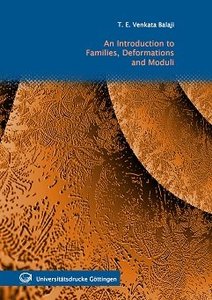An Introduction to Families, Deformations and Moduli

An Introduction to Families, Deformations and Moduli by T. E. Venkata Balaji
English | 2010 | ISBN: 3941875329 | 208 pages | PDF | 3 MB
Moduli Theory is one of those areas of Mathematics that has fascinated minds from classical to modern times. This has been so because it reveals beautiful Geometry naturally hidden in questions involving classification of geometric objects and because of the profound use of the methods of several areas of Mathematics like Algebra, Number Theory, Topology and Analysis to achieve this revelation. A study of Moduli Theory would therefore give senior undergraduate and graduate students an integrated view of Mathematics.
Broadly speaking, Moduli Theory involves the discovery of rich geometric structures on the set of isomorphism (or suitable equivalence) classes of familiar objects from Geometry, such as manifolds, varieties and bundles over them. This book is a humble and basic introduction to the fundamental notions of family and deformation, together with their role in the construction of moduli spaces. The attempt is to capture the genesis of the main denitions and results of the theory from heuristic ideas. This is done by fostering a mathematical intuition that is grounded in some basic (though nontrivial) motivating examples. These examples serve not only to point to the kind of results one can expect, but also to pathologies that commonly arise in the construction of moduli spaces.
The goals of this book are:
(1) to explain the notion of a family and construct nontrivial examples of families;
(2) to explain the notion of an infinitesimal deformation of complex structure;
(3) to compute all the infinitesimal deformations of any complex torus (of arbitrary dimension) and of any holomorphic line bundle of degree zero on a compact Riemann surface;
(4) to explain the definitions and the major results of the Theory of Local Moduli of Kodaira-Spencer and apply these results to justify Riemann's formula for the number of moduli of a compact Riemann surface;
(5) to explain Kuranishi's Theorem and to give some of its applications;
(6) to explain the notion of a local moduli space and give some examples;
(7) to explain the notion of a moduli problem, of a coarse moduli space and of a fine moduli space;
(8) to construct the fine moduli space from local moduli spaces for the problem of moduli of holomorphic line bundles of degree zero on a compact Riemann surface;
(9) to construct the coarse moduli space from local moduli spaces for the problem of moduli of elliptic curves over the field of complex numbers;
(10) to present the Theory of Moduli as a topic whose study draws from and enriches diverse areas of Mathematics.
Buy Premium From My Links To Get Resumable Support,Max Speed & Support Me

https://uploadgig.com/file/download/Ba06fAaA4E8Cb60d/ja5zo.An.Introduction.to.Families.Deformations.and.Moduli.rar

https://rapidgator.net/file/93866f13c5ed85eb0e35981fa068684c/ja5zo.An.Introduction.to.Families.Deformations.and.Moduli.rar.html

http://nitroflare.com/view/415E1FB14C3082E/ja5zo.An.Introduction.to.Families.Deformations.and.Moduli.rar
Significant surge in the popularity of free ebook download platforms. These virtual repositories offer an unparalleled range, covering genres that span from classic literature to contemporary non-fiction, and everything in between. Enthusiasts of reading can easily indulge in their passion by accessing free books download online services, which provide instant access to a wealth of knowledge and stories without the physical constraints of space or the financial burden of purchasing hardcover editions.

Comments (0)
Users of Guests are not allowed to comment this publication.